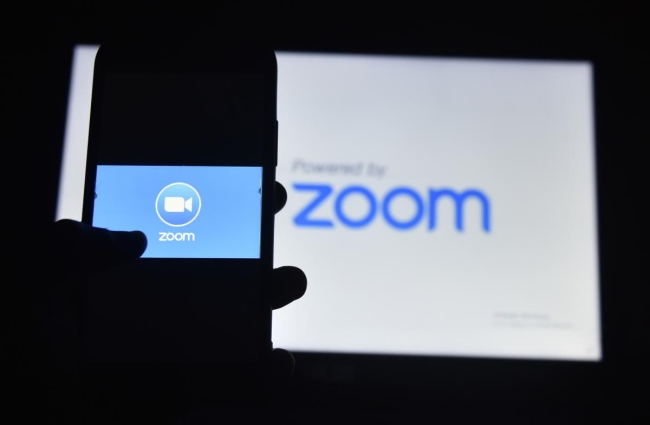You have /5 articles left.
Sign up for a free account or log in.

Zoom published a new policy on academic freedom for higher education users of its videoconferencing services, sparking debate about whether its protections go far enough.
NurPhoto/Contributor/Getty Images
Videoconferencing platform Zoom published a new policy giving higher education institutions greater control over their online events and the speakers to whom they chose to give platforms.
For academics and groups supporting free speech and academic freedom who reviewed the policy last week, the changes are a welcome step in the right direction. But some critics worry the policy doesn’t go far enough and the company could still exercise its power to censor certain academic discussions and debates.
Zoom came under fire last year for canceling several university-organized events featuring Leila Khaled, a Palestinian woman who is associated with a U.S.-designated terrorist group and was involved in two attempted plane hijackings in the late 1960s and early ’70s.
Zoom canceled an event featuring Khaled at San Francisco State University in the fall after pressure from pro-Israel groups such as the Lawfare Project, a nonprofit that works to protect the human and civil rights of Jewish communities. Several subsequent events at other institutions were also canceled by Zoom and other platforms such as Facebook and YouTube.
At the time, Zoom said it had canceled the event because of Khaled’s “reported affiliation or membership in a U.S. designated foreign terrorist organization” and Zoom's determination that the San Francisco State meeting was a violation of the company’s terms of service.
In its new policy, titled "On Academic Freedom for our Higher Education Users," Zoom outlined the steps it will now take in response to complaints that an event hosted by a higher education institution is breaking company rules.
For a meeting or event hosted by a college or university, Zoom said its trust and safety team will only act on reports of content-related violations that come from the meeting’s hosts or account administrators.
Zoom may, however, act on complaints from other parties if the company determines there is a legal or regulatory risk to the company if it does not act. It may also act on reports alleging an immediate threat to the physical safety of any person or reports that a meeting is unrelated to an institution’s academics or operations.
Whether the new policy will change how Zoom handles events with speakers such as Khaled will depend on how conservative the company is when determining a potential legal or regulatory risk, said Sarah McLaughlin, a senior program officer at the Foundation for Individual Rights in Education, a group that advocates for free speech on campuses.
“Zoom should make clear whether it intends to treat events with Khaled or speakers like her differently going forward,” McLaughlin said in an email. “Additionally, Zoom should make clear what ‘legal or regulatory risks’ will require the service to censor events.”
Khaled is due to speak at an online event organized by the Arab and Muslim Ethnicities and Diasporas Studies program at San Francisco State University, the Council of University of California Faculty Associations and the University of California Humanities Research Institute on April 23. The event will be a big test for Zoom’s new policy, wrote McLaughlin in a recent blog post for FIRE.
Zoom did not respond to requests for comment asking when the policy was published and how it was developed, but it appears to have come in response to concerns from faculty at the University of California. Brian Soucek, a law professor at the University of California, Davis, and chair of the UC system Academic Senate Committee on Academic Freedom, tweeted that he and colleagues had been meeting with Zoom's lawyers since January.
"I think it's fair to say that before the pandemic, neither the lawyers at Zoom nor those at most universities were thinking much about how Zoom's terms of service might affect academic freedom. It wasn't part of our contract negotiations," said Soucek in an email. "But once university operations moved almost entirely to Zoom and similar platforms, that issue became unavoidable. We can't just have universities outsourcing their academic freedom and First Amendment responsibilities to private companies."
The University of California's academic freedom committee called on the administration to re-negotiate its contract with Zoom to protect academic freedom and students' speech rights in December of 2020, said Soucek. He added that Zoom's team was very willing to work with people with expertise on these issues, and developed a policy that applies to all higher ed users, not just the University of California.
Zoom’s new policy is a welcome development, but it isn’t perfect, said Hank Reichman, chair of the American Association of University Professors’ Committee on Academic Freedom and Tenure, who wrote about the policy for AAUP’s "Academe" blog.
“The thrust of the policy is saying, ‘We’re not going to censor. It’s up to the universities to do that if they want to do it,’” Reichman said. “But they do make those exceptions … and we know that corporate attorneys tend to be overly protective. They could interpret the company is in legal jeopardy even if we think that is not the way the law would be interpreted.”
Given that Zoom advertises itself as providing educational services, it is disappointing that the company took so long to “acknowledge its uneasy relations to academic freedom,” said McLaughlin, of FIRE. In recent months, faculty groups have begun to push for institutions to find alternatives to Zoom, she said.
“It would not surprise me if the potential loss of campus contracts encouraged Zoom to clarify its position on academic freedom,” McLaughlin said.
Reichman of the AAUP took a slightly different view. He is among academics who have called the trend of institutions outsourcing key services to private for-profit entities a “troubling phenomenon.”
But Zoom wasn’t designed for higher education, couldn’t have anticipated how dependent institutions would become on its services and likely never thought about academic freedom questions before, he said.




